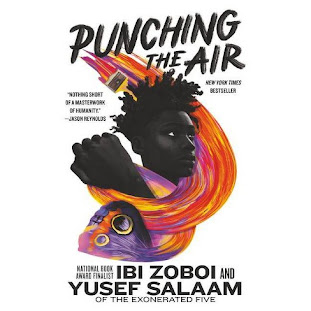Punching the Air
By Ibi Zoboi and Yusef Salaam
Bibliography:
Zoboi, I., & Salaam, Y. (2020). Punching the air. Balzer & Bray/Harperteen.
Summary:Punching the Air is a novelized poetry book that tells the story of a wrongly incarcerated black Muslim teenage boy, Amal, co-written by Ibi Zoboi and Yusef Salaam. Each poem works together to build the story of Amal's conviction, experiences while incarcerated, and legal journey to possibly be exonerated.
Yusef Salaam is one of the Central Park Five who were wrongly convicted of the assault and rape of a white woman in 1989. The poetry book contains poems written specifically for the narrative of the novel with original characters and experiences, as well as poems that Salaam wrote himself while serving his sentence.
Analysis:Punching the Air is a deeply emotional collection of narrative poetry that uses visual form, comparisons, and occasional rhyming to evoke feelings of tragedy, disbelief, rage, regret, and disappointment at Amal's situation and the other characters in the book. These poems reflect the society that Salaam was imprisoned in and, unfortunately, the society we are still facing in the United States today. From the perspective of a white woman reading these poems, I was completely enthralled. It is very easy to pick up on the personal feelings and thoughts that went into each poem and empathize with Amal. I found myself feeling disgusted at the teacher who let Amal down as a character witness and could see the reflection of her character in so many community figures who try to portray a "white savior" complex while not having the heart of actually believing in the kids they are supposedly helping. This poetry novel can so easily speak to any children, teenagers, or adults who have experienced wrongful convictions either first-hand or through loved ones.
Aside from the enthralling storyline, Zoboi and Salaam use the narrative to promote the therapeutic and connecting nature of poetry while connecting it to the musical language of rapping and other artistic outlets. Amal is an artist in multiple facets and using poetry and art to express himself and escape the mental confines of his imprisonment and inspire the other inmates. The use (and abuse) of the art itself is also used to reassert the discrimination that Amal faces while in prison.
The physical layout of the poems also contribute to their meaning and impact. The excerpt poem that I have included is an excellent example of this. The first line and full stanza stand alone on the left page, with the following line and full stanza reflected on the right. The final two stanzas stand together centered on the next page with nothing on the opposing side. This formatting provides a direct comparison of Amal and his black friends and the white boys that were involved in the incident that led to Amal's arrest.
Excerpt:
Blind Justice IIAll because
we were in the wrong placewe were in the wrongs skinswe were in the wrong timewe were in the wrong bodieswe were in the wrong countrywe were in the wrongwere in the wrongin the wrongthe wrongwrong
All because
they were in the right placethey were in the right skinsthey were in the right timethey were in the right bodiesthey were in the right countrythey were in the rightwere in the rightin the rightthe rightrightWe were
a mob
a gang
ghetto
a pack of wolves
animals
thugs
hoodlums
men
They were
kids
having fun
home
loved
supported
protected
full of potential
boys
Activity Idea:The subject matter of Punching the Air and this example poem is very deep, heavy, and emotional, so it does not seem appropriate to try and create a fun-filled activity to coincide with such meaningful content. Instead, this would be a good time to ask students to dig a little deeper and encourage them to feel comfortable with writing something more painful or personal. These of course do not have to be shared, but it is an activity that is intended to get them thinking more about their own emotions/lives/situations, whether that's from a cultural standpoint, individual, or whatever various factors they deem best suited. They can also play with meaning through visual form, like the example poem does with the comparison between how the black teenage boys were viewed and talked about compared to the white teenage boys of the same age.
All because
we were in the wrong place
we were in the wrongs skins
we were in the wrong time
we were in the wrong bodies
we were in the wrong country
we were in the wrong
were in the wrong
in the wrong
the wrong
wrong
All because
they were in the right place
they were in the right skins
they were in the right time
they were in the right bodies
they were in the right country
they were in the right
were in the right
in the right
the right
right
We werea mob
a gang
ghetto
a pack of wolves
animals
thugs
hoodlums
men
They were
kids
having fun
home
loved
supported
protected
full of potential
boys

Comments
Post a Comment